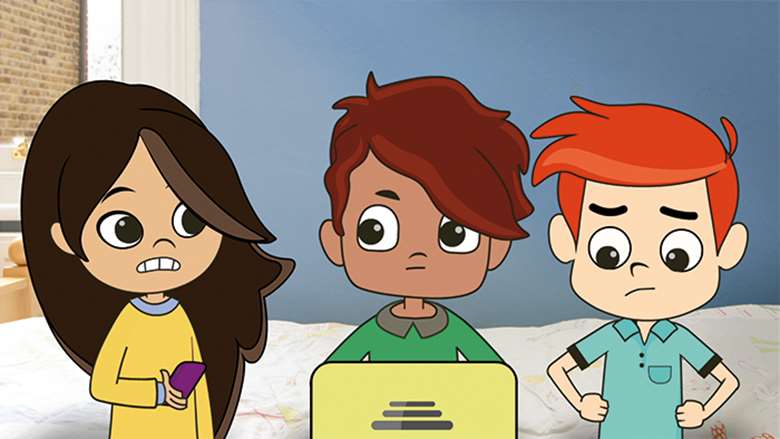Play Like Share
Derren Hayes
Tuesday, August 29, 2017
Films and online resource helps children aged eight to 10 think about manipulative online behaviours in an engaging way.

- The films use language and scenarios that resonate with children, encouraging discussion
- The resource pack and films have been downloaded nearly 6,500 times since November 2016
ACTION
Research by Ofcom shows the extent to which children aged eight to 11 engage with the online world. The Children and parents: media use and attitudes report 2016 found that 80 per cent use a tablet computer, three-quarters watch YouTube regularly and nearly one in four have a social media profile. That children are going online at an increasingly young age is not surprising, but in doing so, they increase the risk that they may encounter people online who can manipulate or threaten them.
Recognising this, the Child Exploitation and Online Protection Centre (Ceop) identified the need to develop an age-specific resource to help children develop the skills, knowledge and resilience to protect themselves against online sexual abuse and exploitation.
"Through our direct work with children and practitioners, we identified there was an appetite for a resource that accurately reflected how eight- to 10-year-olds were using the internet - with gaming and social networking being key aspects of their friendships and use of free time," explains Marie Smith, head of education at Ceop.
Smith says that developing such a resource was not easy as levels of maturity and development, in addition to online activities, vary greatly across this age group.
Consequently, the resource it developed - Play Like Share - focuses on educating children about risky behaviours rather than specific websites or apps.
Play Like Share is a learning package incorporating three short animated films that follow three pupils as they encounter and navigate their way through a series of scenarios. It is accompanied by a downloadable teaching pack to aid classroom discussion and related activities.
"Whether or not a child of this age is specifically using social media, the types of online activities the film characters engage in will be familiar," says Smith. "We strived to create a non-frightening, fun and empowering resource based on realistic scenarios."
The resource aims to empower children so they can spot the early signs of manipulative, pressurising or threatening behaviour, and know when and where to turn for help, explains Smith.
She adds: "The films do not depict any scenario involving an adult sexual offender, as this could raise confusing, frightening or age-inappropriate questions about why an adult might behave in this way towards a child. Instead, Play Like Share uses relatable peer-on-peer scenarios, encouraging children to focus on behaviours rather than motivations."
Each film features key messages such as understanding that people's identities online may not reflect who they really are. Other issues to be explored through the film's storylines include the impact that posting malicious comments on social media can have, and how films uploaded to video-sharing websites such as YouTube can attract unwanted attention.
"We wanted the scenarios to be realistic and relatable, while also making children aware of the behaviours that offenders adopt," says Smith. "The films feature the key safety messages, while in-depth learning is drawn out in the accompanying session plans, which include a range of fun activities and workbooks for the children to personalise."
There are two session plans to use with children depending on their maturity and online engagement. In addition, optional sessions are available for children displaying particularly concerning behaviour, such as inappropriate online contact with adults.
Smith says the films can be used by parents to "find out as much as they can about what their child does online and what it means to them". "Starting these chats can often be difficult and for children it can feel like an interrogation rather than a conversation," she says. "Children need the reassurance that they will be listened to and given support whatever the situation - this will make them much more likely to ask for help should they need to."
IMPACT
Since its launch in November 2016, Play Like Share has been downloaded nearly 6,500 times. "The response has been fantastic," says Smith. "Practitioners have commented that the resource fills a gap and is helping them to respond to issues they are encountering on a regular basis around social media, gaming and live-streaming."
Matt Lovegrove, a teacher at Beechwood Primary School in Wokingham, used Play Like Share with his year 3 and 4 pupils in the summer term. He says the animated films have been very effective at engaging the pupils.
"Children love cartoons and they didn't recognise that this had an educational element," he explains. "The events depicted happen in a school, so it's relevant to them - they really related to the characters and situations.
"After watching the first film, they were pleading for me to put on the second one. Anything that engages children at that level is a great thing."
Lovegrove, who leads on e-safety at the school and also runs an online safety consultancy, plans to use Play Like Share with years 5 and 6 from September.
In the autumn, Ceop is also launching a new online game and website to consolidate learning.
Read more from the E-Safety and Online Safeguarding special report




